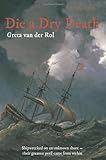 Die A Dry Death by Greta van der Rol
Die A Dry Death by Greta van der RolMy rating: 4 of 5 stars
When I started reading Die a Dry Death, I knew what I was in for. Or so I thought. I had read much of the first chapters when the book appeared on Authonomy some time ago, and I believed I remembered the story well.
I did. And... I didn't.
While I'm no expert on historical fiction by any measure, I kept feeling that this story felt authentic, through and through. No detail rang false, and there is detail aplenty in this tale. Being a fan of such descriptive language, I revelled in much of the writing for that reason. I have no doubt that Greta van der Rol is a writer of remarkable talent, and her skill with words is undeniable. She has incredible control over the tension of the story, building it steadily and sweeping the reader right along in its current, balancing several plotlines and making it look ridiculously easy.
At some point early on, however, my "writer" hat fell off and I was lost in the story itself. I was pulled down into the story as inexorably as the Batavia herself was drawn down into the sea, and as the castaways of the shipwreck were drawn helplessly under the control of a frightening despot who emerged amongst them.
There were times I wanted to just put this book down and walk away. Not for the reason one normally would do such a thing, but for very different reasons. I quickly found myself invested in the characters and I had begun to care about them. As there were moments I knew were coming - since this novel was based on true events, they are a matter of historical record - I wasn't sure I wanted to read them. I repeatedly hoped that these people would evade their fates and the story would take a happier (albeit unrealistic) turn, and continued reading.
This, I believe, is a sign of brilliant writing and characterization, when a reader is so drawn into a story they hope for an outcome different from what they know to expect.
Cornelisz is the worst kind of villian - in the sense that his like surely walk amongst us every day. An outwardly unremarkable individual, he nonetheless seizes his opportunities where he finds them, and his innate powers of persuasion lead to his command over the slaughter of innocents. The events which unfold on the island called Batavia's Graveyard are all the more horrific for their resemblance to other such events in more modern times.
Again and again, I found myself frustrated by the behavior of the women in the story. For example, at times my frustration with Lucretia van der Mijlen was such that I found myself agreeing with the men who thought she was snobbish and vain, thinking herself better than everyone else. Van der Rol has written these women vividly and so true to the period that I wanted them to do precisely what they could not: to stand up to the foul, restrictive treatment they received throughout the novel. Once more, I felt this was a sign of how well the characters were written. I cared - deeply, vehemently - about their fates.
There was one small twist near the end of the story which, though I anticipated it, still moved me close to tears. If these characters weren't so fully realized, I doubt that would have been the case.
Die a Dry Death is a deeply unnerving tale, based on true events and told in a rich, evocative voice which draws a reader in and doesn't let go until well after the last page is turned and the book is set aside. I highly recommend it to anyone, not just fans of historical fiction or period stories.
View all my reviews
 RSS Feed
RSS Feed
